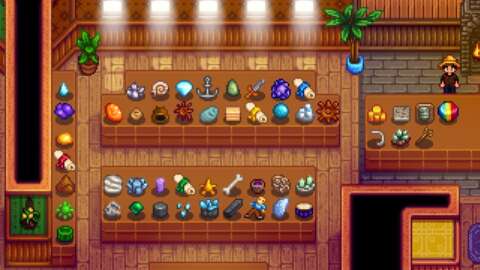GameSpot may receive revenue from affiliate and advertising partnerships for sharing this content and from purchases through links.
Early into Stardew Valley, Gunther from the Museum will come to you with a request. He tells you that the Museum is lacking when it comes to real artifacts and asks you to donate any rare items you find to him. The Museum functions similar to one in the Animal Crossing games, where you need to donate one of each item to complete the collection. Completing the entire collection will earn you a Stardrop, which permanently increases your max energy.
How the museum works
The Museum is open from 8am to 6pm, except during town festivals. It is located in the southeast corner of town, next to the Blacksmith. Inside is a large collection of books, which is where you can read any lost books you find, and a large display area, where new donations go. To donate an item, speak with Gunther and he will let you place any new donations wherever you want, with the option to move them later.
Gunther will also give rewards at certain milestones, including once you donate a total number of certain items, and individual paths for both Artifacts and Minerals. Most of the rewards are nice bonuses, but unimportant, with three exceptions. At 60 items you get the key to the sewers, at 95 items you get a Stardrop, and if you donate all four Dwarvish Scrolls, you get the Dwarvish Translation Guide, which allows you to communicate with Dwarves.
Artifacts and Minerals

There are many different ways to acquire the items for donation, which change depending on which of the two categories they belong to. There are 95 items total: 53 Minerals and 42 Artifacts.
Minerals are typically found via mining, although there are a couple of other ways to obtain them. Gems can be found in their corresponding nodes–an Emerald node gives an Emerald, for example, and the generic Gem Node, gives a random gem. The four foraged minerals–Quartz, Earth Crystal, Frozen Tear, and Fire Quartz–can be found in the mines and the Skull Cavern.
The last and largest group are the Geode Minerals, which are obtained from cracking open geodes. Geodes, which appear as basic Geodes, Frozen Geodes, Lava Geodes, and Omni Geodes, can be opened at the Blacksmith at the cost of 25G each. While the first three types of geodes can only contain certain minerals, the Omni Geode has the chance to contain any of them, making it the best way to find them. Some Minerals can also be found in fishing treasure chests, but due to the randomness of those, it’s an inefficient way to find them.
Artifacts are a bit harder to reliably search for. Some of them, like the Dwarf Scrolls, can be dropped by monsters inside the mines and Skull Cavern. Others only have a chance to appear when you use your hoe on artifact spots, which are spots that appear in the dirt around town that look like three wiggling worms sticking out of the ground. Others can appear in Artifact Troves, which can be purchased from the Desert Trader for 5 Omni Geodes. Artifacts appear in fishing treasure chests occasionally as well, although not all of them can.
Check out the Stardew Valley Wiki pages for Minerals and Artifacts for exact probabilities of each individual item.
When it comes to completing the Museum, it’s best to let yourself find most of the Artifacts and Minerals naturally. Once you get the majority donated, around the 80 mark, you can start to focus on the items you are missing and farming for those specifically. The majority of these items only have a slight chance to appear, so even if you are trying to find them, it mostly comes down to chance.
Got a news tip or want to contact us directly? Email news@gamespot.com

